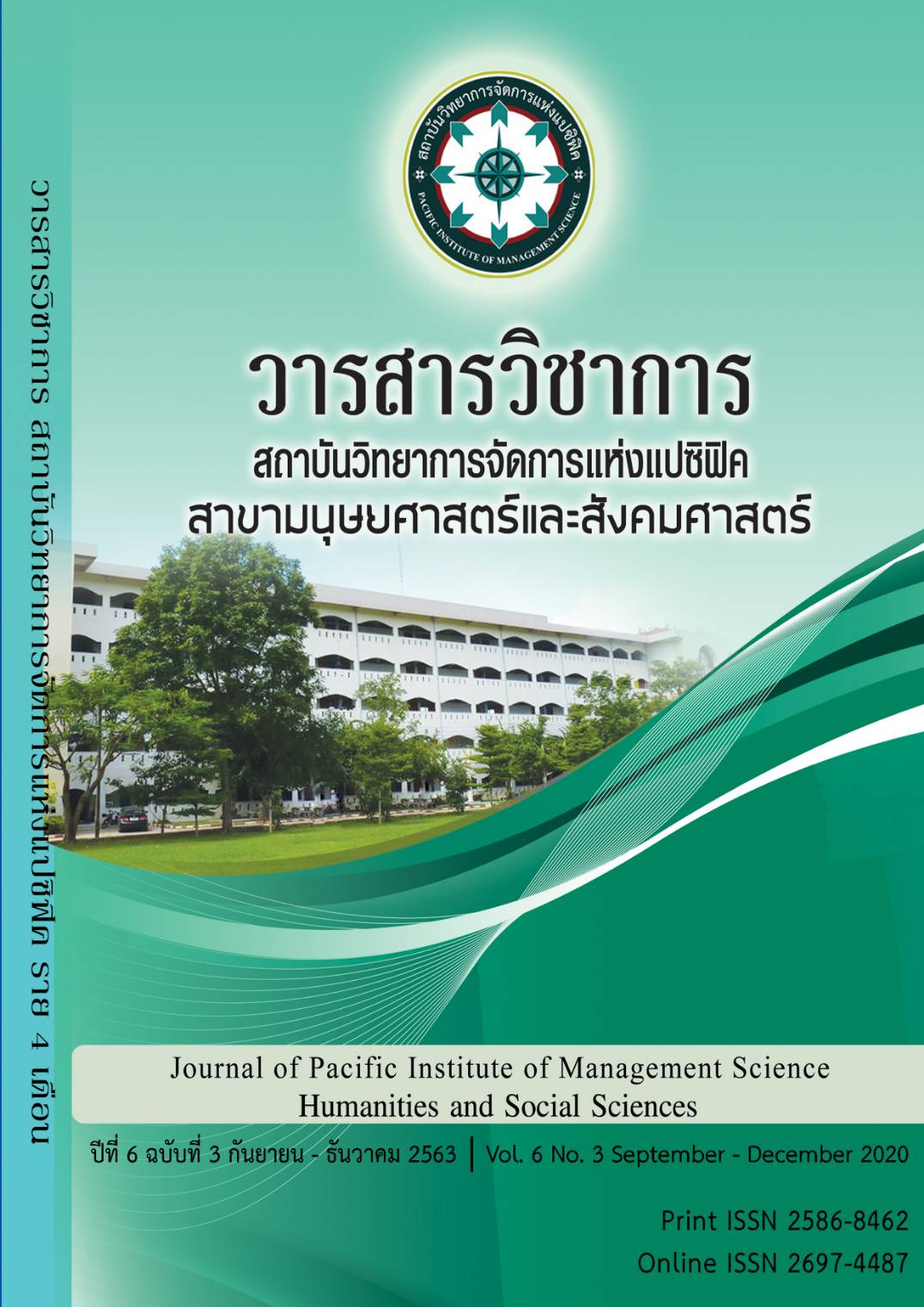The Development of Instructional Model Using Project-Based Learning with Online Social Media to Enhance Speaking Skills of Pre-Service Teachers
Keywords:
Instructional Model Using Project-Based Learning, Speaking Skills, Social MediaAbstract
The purposes of this research were to: 1) study the efficiency of the instructional model using project-based learning with online social media to enhance speaking skills of pre-service teachers 2) study the effectiveness of the instructional model using project-based learning with online social media by comparing Pretest and Posttest scores after using this model and the development of speaking skills through the presentation of project 3) study the levels of student satisfaction towards the developed teaching model. The sample was 19 second year Educational Technology and Computer students studying at Faculty of Education during the 2nd semester of the 2019 academic year. The instruments were the English speaking skills assessment test, development of speaking skills assessment form and questionnaire. The data were analyzed by mean, standard deviation, t-test dependent, t-test independent and content analysis.
The finding were as follows:
- The instructional model using project-based learning with online social media to enhance speaking skills of pre-service teachers called “ESCAPE Model” consisted of 1) Exploring the ideas: E 2) Starting plan for the project: S 3) Creating an outline: C 4) Analyzing information to do the project: A 5) Presenting the project: P and 6) Evaluating the project: E. The efficiency of the ESCAPE Model met the criterion of 70.75/70.10
- The effectiveness of the ESCAPE Model indicated that 1) after using the ESCAPE Model, the students’ levels of speaking ability were higher than before receiving the instruction at a .05 significance level, 2) the development of speaking skills through the presentation of project after using ESCAPE Model were at a high level.
- The students’ satisfaction toward the instructional model using project-based learning with online social media was at a high level.
References
ขนิษฐา นาคน้อย. (2550). การศึกษาผลการจัดการเรียนรู้ด้วยโครงงานที่มีต่อความสามารถในการใช้ภาษาอังกฤษเพื่อการสื่อสารของนักเรียนชั้นมัธยมศึกษาปีที่ 2 โรงเรียนเฉลิมพระเกียรติ สมเด็จพระศรีนครินทร์ กำแพงเพชร. (ปริญญานิพนธ์ ศศ.ม. การสอนภาษาอังกฤษในฐานะภาษาต่างประเทศ บัณฑิตวิทยาลัย, มหาวิทยาลัยศรีนครินทรวิโรฒ).
คำมูล งอกบุ้งคล้า. (2550). การวิจัยเชิงปฏิบัติการ เรื่อง การพัฒนาความสามารถในการพูดภาษาอังกฤษของนักเรียนโดยใช้กิจกรรมโครงงาน. (วิทยานิพนธ์ปริญญาศิลปศาสตรมหาบัณฑิต สาขาวิชาภาษาอังกฤษ บัณฑิตวิทยาลัย, มหาวิทยาลัยขอนแก่น).
ดุษฎี โยเหลา และ คณะ. (2557). การศึกษาการจัดการเรียนรู้แบบ PBL ที่ได้จากโครงการสร้างชุดความรู้เพื่อสร้างเสริมทักษะแห่งศตวรรษที่ 21 ของเด็กและเยาวชน: จากประสบการณ์ความสำเร็จของโรงเรียนไทย. กรุงเทพฯ: หจก. ทิพยวิสุทธิ์.
ธุวพร ตันตระกูล. (2557). การพัฒนาทักษะการพูดภาษาอังกฤษในชีวิตประจำวันโดยใช้บทฝึกการสนทนาภาษาอังกฤษ. งานวิจัยเพื่อพัฒนาการเรียนการสอน. กรุงเทพฯ: สถาบันภาษาและวัฒนธรรมนานาชาติ มหาวิทยาลัยศรีปทุม.
ไพฑูรย์ นันตะสุคนธ์ และวัลลภา อยู่ทอง. (2557). การจัดการเรียนรู้แบบโครงงานเป็นฐาน. หน่วยศึกษานิเทศก์: สำนักงานคณะกรรมการการอาชีวศึกษา.
ภคพล หัสสา. (2553). การพัฒนาความสามารถในการพดูภาษาอังกฤษของนักเรียน ชั้นประถมศึกษาปีที่5 ที่เรียนโดยกลวิธีการชดเชยการสื่อสาร. (ปริญญานิพนธ์ศึกษาศาสตรมหาบัณฑิต สาขาวิชาการสอนภาษาอังกฤษ สำหรับผู้พูดภาษาอื่น, มหาวิยาลัยราชภัฏอุดรธานี).
ลัคนา วัฒนาชีวะกุล. (2561). เทคนิคการจัดการเรียนรู้แบบใช้โครงงานเป็นฐาน (Project-based learning), สืบค้นเมื่อ15 มกราคม 2562, จาก https://erp.mju.ac.th/acticleDetail.aspx?qid=818.
สำนักงานคณะกรรมการการอุดมศึกษา กระทรวงศึกษาธิการ. (2551). วิพากษ์อุดมศึกษาไทย. กรุงเทพมหานคร: หจก. อาร์ตโปรเกส จำกัด.
อติกานต์ ทองมาก. (2552). การใช้วิธีการสอนภาษาอังกฤษแบบโครงงานเพื่อพัฒนาทักษะการพูดภาษาอังกฤษและทักษะการคิดของนักเรียนชั้นประถมศึกษาปีที่ 5 โรงเรียนบ้านควนสวรรค์ จังหวัดตรัง. (ปริญญานิพนธ์ศิลปศาสตรมหาบัณฑิต สาขาการสอนภาษาอังกฤษในฐานะภาษาต่างประเทศ, มหาวิทยาลัยศรีนครินทรวิโรฒ).
Harun, Y. (2006). Project-Based Learning handbook “Educating the Millennial Learner’’. Kuala Lumpur: Educational Technology Division Ministry of Education.
Kerdpol, S. (2016). An Application of Project-Based Learning on the Development of Young Local Tour Guides on Tai Phuan’s Culture and Tourist Attractions in Sisatchanalai District, Sukhothai Province. English Language Teaching, (9), 133-141.
Ribe, R. and Vidal, N. (1993). Project Work Step by Step. Oxford: Heinemann.
Tribolet, C. (2012). Using Cognitive Strategies to Improve English Speaking Skill and Self-confidence. American Journal of Education Sciences, 2(3), 36-40.
Sarkis, R. (2012). Using Cognitive Strategies to Improve English Speaking Skill and Self-confidence. American Journal of Education Sciences, 2(4), 19-23.
Vivitkunkasem, K. (2014). Include articles on technology and communication education: Innovation blended learning. Bangkok: Chulalongkorn University Press. [in Thai]
Downloads
Published
Issue
Section
License
บทความที่ได้รับการตีพิมพ์เป็นลิขสิทธิ์ของ สถาบันวิทยาการจัดการแห่งแปซิฟิค
ข้อความที่ปรากฏในบทความแต่ละเรื่องในวารสารวิชาการเล่มนี้เป็นความคิดเห็นส่วนตัวของผู้เขียนแต่ละท่านไม่เกี่ยวข้องกับสถาบันวิทยาการจัดการแห่งแปซิฟิค และคณาจารย์ท่านอื่นๆในสถาบันฯ แต่อย่างใด ความรับผิดชอบองค์ประกอบทั้งหมดของบทความแต่ละเรื่องเป็นของผู้เขียนแต่ละท่าน หากมีความผิดพลาดใดๆ ผู้เขียนแต่ละท่านจะรับผิดชอบบทความของตนเองแต่ผู้เดียว







